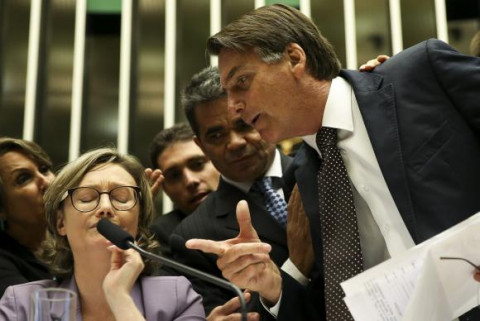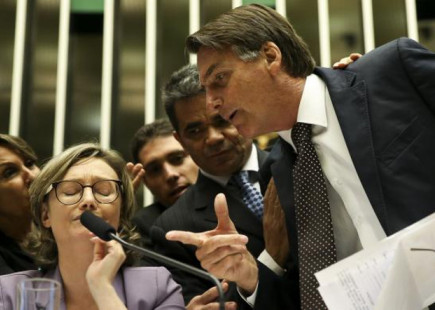Ideas into movement
Boost TNI's work
50 years. Hundreds of social struggles. Countless ideas turned into movement.
Support us as we celebrate our 50th anniversary in 2024.

Jair Bolsonaro's victory on October 28 turns Brazil towards the extreme right and backwards in several aspects of its democratic transition initiated with the 1988 Constitution, especially those related to social justice, environment, human rights and the economy. Understanding why he was elected and what he represents is key to grasping the new Brazil emerging from the election and what to expect for the near future.

https://commons.wikimedia.org/wiki/File:1044950-df_img_2182.jpg

https://commons.wikimedia.org/wiki/File:1044950-df_img_2182.jpg
Just one year ago, few analysts would say the Workers’ Party (PT, by its acronym in portuguese) would be fighting the second round of the presidential elections with a real chance of winning again. But that´s what happened, for the fifth time in a row. Fernando Haddad (PT) received 44.5% of the vote (or around 47 million votes). His party also elected the largest number of state governors (4 out of 27), has the largest number of elected congressmen (56) and the fourth largest representation in the Senate (6). Despite the defeated presidential run, this result means the PT will remain a very strong political voice within Brazilian society and might be considered a victory in itself, contrary to forecasts that the party would be wiped out from the political landscape this year. In that sense, the PT's electoral resilience has proven to be remarkable, which will continue to be a problem for the conservative forces now in power.
Although a consistent rise in support for Fernando Haddad took shape in the last weeks before the election, it was not enough to counter-balance the 55.5% who voted for Jair Bolsonaro from Social Liberal Party (PSL for its acronym in Portuguese). According to DataFolha polls from October 25, Fernando Haddad enjoyed the most support among low-income sectors, women and youth. Bolsonaro won among men (55%-45%) and among medium-high income sectors.
There are several other factors to consider to understand the outcome, and here I mention just a few. First, sectors of Brazilian society have been nurturing a moral hatred for former President Lula and the PT since 2006, when a corruption scandal hit the party for the first time. Almost every party in Brazilian politics is involved in some sort of corruption, including Bolsonaro's but the PT has been more severely judged by public opinion because of a long-standing discourse of self-proclaimed “ethics in doing politics” that characterized it's narrative since the 1989 elections.
Up to 2011-2012, while the economy was still relatively prosperous for all, right-wing opposition had been weak and fragmented, but a conservative political counter-narrative was growing in local communities and Lula's win-win social pact was starting to show its limits. Social and environmental conflicts were building underneath the neodevelopmentalist project surface, relatively unseen and often motivated by mega-construction projects led by the Federal Government, be they infrastructure, oil drilling or Soccer World Cup/Olympic Games related works.
A second factor to consider are the so called Free Pass mobilizations that took place in June 2013 – originally a progressive mobilization agenda for the right to public transportation that was taken over by free-rider, outsider, right-wing movements, taking advantage of the political momentum they had no part in creating. From 2014 onwards, as the economy slowed further, the streets were increasingly taken by right-wing demonstrations against the PT. A growing wave of hate fueled false accusations, which eventually led to Dilma Rousseff's shameful impeachment (leading to the illegitimate arrival of Michel Temer to power) and Lula's controversial arrest.
A third component of Brazil's electoral result is related to the role played by democratic center-right forces. During the 13 years that the PT was in power, center-right forces failed miserably to produce competitive democratic leaders who could challenge the Workers’ Party hegemony. Instead, democratic center-right parties (mainly Brazilian Social Democratic Party - PSDB for its acronym in Portuguese) chose to be major players in the over-throw of Rousseff and participated enthusiastically in former vice-president Michel Temer's administration – a decision that strongly backfired in 2018 as their candidate Geraldo Alckmin, former governor of rich Sao Paulo state, got just 4% of the votes in the first round. Their absence as a qualified right-wing opposition orphaned some conservative sectors leaving a gap – that gap was filled by Bolsonaro's authoritarian discourse.
Making use of social media, Bolsonaro takes advantage of most Brazilians’ lack of interest or capacity for digging into the history and details of politics. For the first time, fake news played an enormous role in influencing a Brazilian election, as happened in other “Springs” around the world or in recent US elections. That allowed Bolsonaro to present himself as a new alternative to traditional politics – understood mainly as corrupt – both by the left and the right. However, Bolsonaro is nothing new. He has been a congressman for more than 20 years, a period in which he has approved only two bill proposals – both his own. More recently he has been part of the “Beef, Bible and Bullets” (Agribusiness, Evangelicals and Guns defenders) parliamentary groups within Congress.
Despite the right-wing buzz about a supposed PT communist agenda being pushed by the PT in Brazil, according to French economist Thomas Pikkety and the World Inequality Report, during the past 15 years inequality has not fallen substantially and the upper strata have become even richer. In fact, since 2011 when the 2008 global crisis started to hit the Brazilian economy harder, a middle-class income squeeze and slightly improved poor class conditions, led to the dissatisfaction of both. As the economy slowed down, the moderate gains from the previous ten years were not enough to meet the consumption expectations that were generated. Families were indebted and started to default on their bills, or their kids’ college loans. Increasingly, a narrative that “the PT has destroyed Brazil” emerged as the synthetic formula to which all dissatisfactions and disappointments converged.
When the economic difficulties arose, consumption fell and prices began to rise. There was not enough ideological connection between the middle classes or poor classes with the Workers’ Party. Many gains from PT governments, such as yearly minimum wage rise above inflation; domestic workers’ bill of rights, Bolsa Família income distribution program, among others, have not been directly attributed to the Worker's Party's specific social and economic policies. Except in the northeastern region of the country, the daily deconstruction of the PT by mainstream media has been more effective than years of social justice policies. It explains, at least in part, why not many people took out to the streets to defend either Rousseff or Lula when needed most.
More Brazilians become evangelicals with each year that passes. Not only has this evangelical growth threatened African-Brazilian religions, but traditional leftist forces face difficulty both engaging with them or countering their social narrative. Although evangelism has brought many people a sense of community and solidarity, it does not relate to the leftist way of framing solidarity and social justice as it has been the case with Catholic liberation theology in the past. Burning issues such as women's right to abortion are an abyssal divide that has also played its role in the presidential campaign. Bolsonaro – evangelical himself – has built his campaign around religion and religious groups. “Brazil on top, God above us all”, ran his campaign slogan.
Political turmoil, economic recession, rising unemployment and violence have led to increasing demands for authority and order among large parts of Brazilian society. That call for authority is linked to the defense of traditional values such as the patriarchal family and heteronormativity , condemning the diversity of gender expression in society as abnormal. In a country that hosts the world's largest gay pride parades, gay communities are now afraid of hate and repression. Some sectors even called for a military coup in order to restore Brazilian political peace.
The longstanding political conflicts between left and right, mostly expressed by the PT versus PSDB polarization, were worn out among parts of the electorate and opened room for other candidates, such as Bolsonaro. Many voters are young people who have no memory of what an authoritarian government looks like, not to mention military dictatorship.
Just like Donald Trump, Bolsonaro picks fights with journalists from mainstream media all the time, calling them leftists and threatening to squeeze them economically when in power. Up to now, Bolsonaro has been a dictator without arms. So far. One of his sons, Eduardo, who was elected as a congressman with the most popular support, has already threatened to shut down the Supreme Court ‘if needed’. His other son, Flavio, was elected to the senate with the widest support in the whole country.
It remains to be seen to what extent he will wipe out democratic institutions and the rule of law and persecute opponents as he has threatened to many times during his campaign. Examples of similar behavior are already visible in Duterte's Philippines, Erdogan's Turkey and Salman's Saudi Arabia. Progressive and Human Rights organizations must quickly understand the need for international monitoring of the new government’s actions and solidarity with Brazilian activists and communities in this new context.
In relation to foreign affairs, if Bolsonaro keeps his neoliberal aspirations, his administration will remain hostage to the same failed discourse that made current President Michel Temer's foreign policy innocuous: a strong bet is a full alignment with US interests at a time when Trump is promoting “America First” and its trade war not only against China, but also taking measures that have hurt the Brazilian steel industry. Both Temer and Bolsonaro state that seeking to diversify Brazilian international relations with as many partners in the world as possible is an ideological policy and that they favor Brazil's “traditional” allies. Western foreign investors and transnational corporations can, therefore, celebrate as deregulation and privatization are on the menu as priorities for the next administration.
At the regional level, if he lives up to his neoliberal promises the Mercosur is at serious risk of extinction. Paulo Guedes, Bolsonaro's future Finance Minister already stated to the Argentinian press that the bloc will not be a priority. More broadly, this statement indicates that Brazil is planning to play solo in the international arena and will no longer have aspirations to be the conducting leader of regional development in South America, not to mention advancing in building its institutions, such as UNASUR. Traditionally led by the US, the OAS (Organization of American States) is likely to be once again the most relevant political body in the region.
The BRICS, a bloc that has the mark of Lula's view of the world affairs, is also set to be relegated to second place. On the other hand, a new push to become a full member of the OECD is expected, in an effort to win market confidence, aiming at signing free trade agreements (FTA) and investment treaties as soon as possible.
Bolsonaro recently made strong statements against Chinese investments in Brazil, saying that they were not only investing, but in fact buying huge portions of Brazilian land and threatening the country's sovereignty. In a world in transformation, turning away from China and regional integration in order to bilaterally negotiate free trade agreements with the Trump administration does not seem very smart. Yet, that seems to be the strategy.
Bolsonaro will face adversities not only at the international level. Domestically, a fractured country has to be dealt with, including its increasing social problems that are unlikely to be solved through austerity, minimum state and neoliberal aperture. On the political side, with Lula in prison Fernando Haddad is now likely to be the key figure in leading the live democratic opposition that has emerged stronger from the electoral process into facing the next challenges.